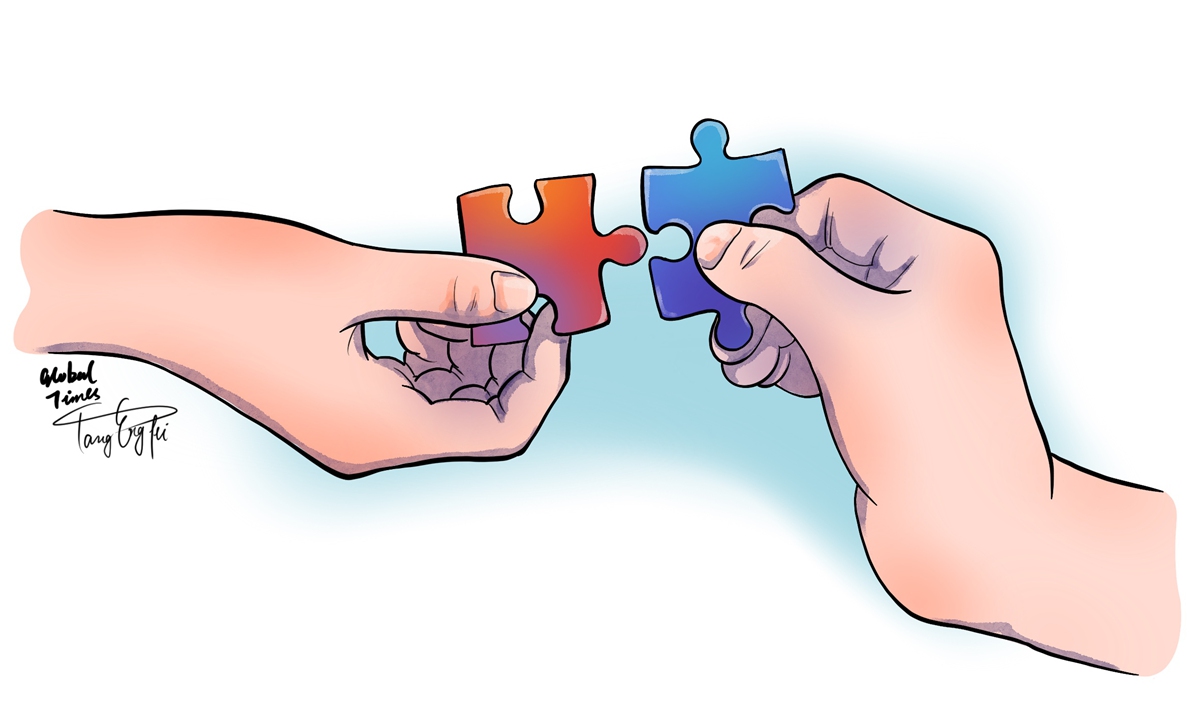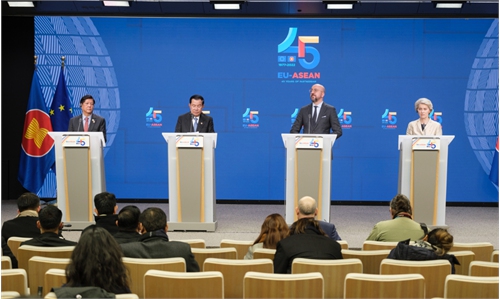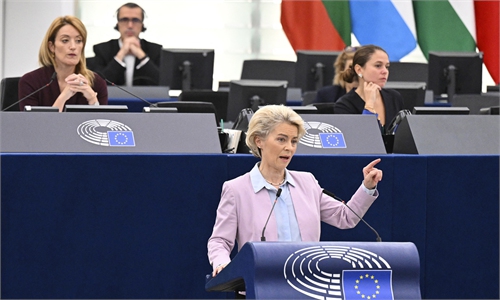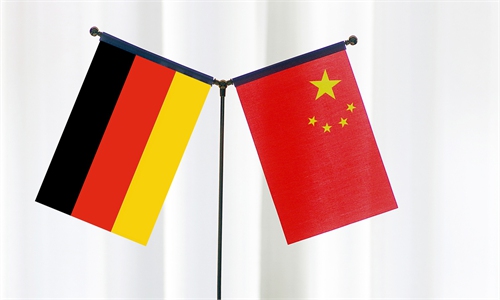
China-EU business competition does not exclude possibility of cooperation in Africa. Illustration:Tang Tengfei/GT
As more European leaders are coming to China for talks in what appears to be a clear shift in approach to China, many are keenly watching for signs of breakthroughs in bilateral ties that have been strained over the past couple of years due to multiple factors, including internal differences and external meddling by the US. For the business communities of both sides, progress on economic and trade cooperation is of paramount importance. In this regard, the China-EU Comprehensive Agreement on Investment (CAI) is arguably one of the thorniest and yet most important items. The sweeping deal has been stuck in the ratification process within the EU and faces mounting challenges, but some positive signs are emerging.
During his high-stakes visit to China on Thursday, European Council President Charles Michel said that the EU stands ready to be a reliable partner for China. Michel, whose visit to China was his first as European Council president, also said that the EU side is willing to continue to advance the process of the China-EU CAI with the Chinese side, while trying to enhance stability and mutual trust over the supply chain, and deepening the mutually beneficial cooperation between the EU and China in various fields, according to the Xinhua News Agency.
The European Council president’s pledge to push forward the China-EU CAI is particularly significant, considering that the agreement reached in late 2020 has been stuck in the European Parliament ever since. The body, which must ratify the deal, voted to “freeze” any consideration of the deal after China countered the EU’s sanction on Chinese officials over Xinjiang. The massive deal is still facing considerable political headwinds within the EU, despite its vast potential for mutual economic benefits. Given all that, it is encouraging to hear Michel’s mention of the EU’s willingness to advance the deal, though it remains to be seen if there will be a feasible path forward within the EU.
Also significant was a call from the Chinese Ministry of Commerce (MOFCOM) on Thursday to push for the signing and implementation of the China-EU CAI. Asked about China’s expectations for Michel’s trip to China in terms of bilateral trade and views on the CAI’s prospects, MOFCOM spokesperson Shu Jueting told a press briefing that China and the EU should work together to promote the signing and entry into force of the agreement, so as to benefit the enterprises and people of both sides as soon as possible. Such remarks from Chinese officials about the CAI are not new, as they have repeatedly called on the EU to cast aside political interference and move forward with ratification of the deal. However, the timing of the MOFCOM spokesperson’s call, which coincided with Michel’s remarks, certainly adds to the positive signs.
There has also been support for the China-EU CAI from leaders of major EU countries. German Chancellor Olaf Scholz, who became the first European leader to visit China since the start of the COVID-19 pandemic, has also publicly expressed his support for the deal. French President Emmanuel Macron, who will reportedly visit China soon, has also called for progress on the deal on various occasions, including during a recent phone call between Chinese and French leaders.
Again, these positive signs do not necessarily mean that European leaders have found a way to overcome the considerable political resistance within the European Parliament. Amid relentless efforts by the US to pressure European countries into joining its geopolitical brinksmanship, anti-China sentiment within certain circles of the EU remains rampant and is unlikely to disappear any time soon. Still, that doesn’t mean that EU leaders cannot push some sensible policies that are vital for economic development in the bloc. One might argue this is an opportune time to do just that considering two factors – the EU’s growing economic woes at home and a fallout with the US over the latter’s protectionist trade policies.
The eurozone’s economy faces a slew of challenges, including record inflation and rocketing energy prices. The IMF has cut its 2023 GDP growth forecast for the eurozone to just 0.5 percent, compared to a forecast of 2.7 percent global growth. Moreover, the EU is facing a pronounced, long-term risk of losing crucial industrial production capacity, because EU businesses are being forced by surging costs at home and protectionist policies in the US to move some of their production capacity out of the continent.
That brings us to the EU’s indignation over the US’ so-called Inflation Reduction Act, whose subsidy provisions could put EU businesses at an unfair disadvantage unless they move to the US. EU officials have been so displeased with the US move that they have threatened countermeasures that analysts say could amount to a subsidy war between the transatlantic partners. Macron, who is in Washington for an official visit, is expected to “confront” US President Joe Biden over the subsidies. Also, there is the issue of US companies selling energy products to the EU at higher prices, which has sparked outrage among many Europeans. The French president is among the most vocal critics of the US profiteering from Europe’s hardship, and he called the move “unacceptable.”
Many have attributed European leaders’ increased engagement with China to the complex economic and geopolitical issues the bloc is facing. While many in the EU still subscribe to the “China threat” or the less provocative “China challenge” theory, they also recognize the need to pursue constructive dialogue and economic and trade cooperation with China. And if the EU really wants to bolster its own economy by engaging with China, what better way is there than ratifying the China-EU CAI? As EU leaders previously stated, the deal would provide greater access to the Chinese market for European investors. As Michel’s remarks in Beijing on Thursday indicate, EU leaders are recognizing that, but the question remains: Will they follow through this time?
The author is an editor with the Global Times. bizopinion@globaltimes.com.cn




